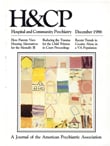Shifting Competency During Hospitalization: A Model for Informed Consent Decisions
Abstract
The demonstration of factual understanding hould be sought when determining a patient's ability to give informed consent, but a patient's failure to demonstrate understanding should not always be equated with an inability ability to competently consent to or refuse treatment. The authors demonstrate the clinical use of a number of standards other than factual understanding. Judgments about competency are derived both from the patient's clinical condition and the risks and benefits inherent in the decision the patient is asked to make. Since both of these conditions may shift during the course of treatment, clinical competency is subject to continual reassessment using a variety of competency standards. The authors demonstrate the use of their model of shifting competency at five junctures in the treatment ofa delusional patient.
Access content
To read the fulltext, please use one of the options below to sign in or purchase access.- Personal login
- Institutional Login
- Sign in via OpenAthens
- Register for access
-
Please login/register if you wish to pair your device and check access availability.
Not a subscriber?
PsychiatryOnline subscription options offer access to the DSM-5 library, books, journals, CME, and patient resources. This all-in-one virtual library provides psychiatrists and mental health professionals with key resources for diagnosis, treatment, research, and professional development.
Need more help? PsychiatryOnline Customer Service may be reached by emailing [email protected] or by calling 800-368-5777 (in the U.S.) or 703-907-7322 (outside the U.S.).



